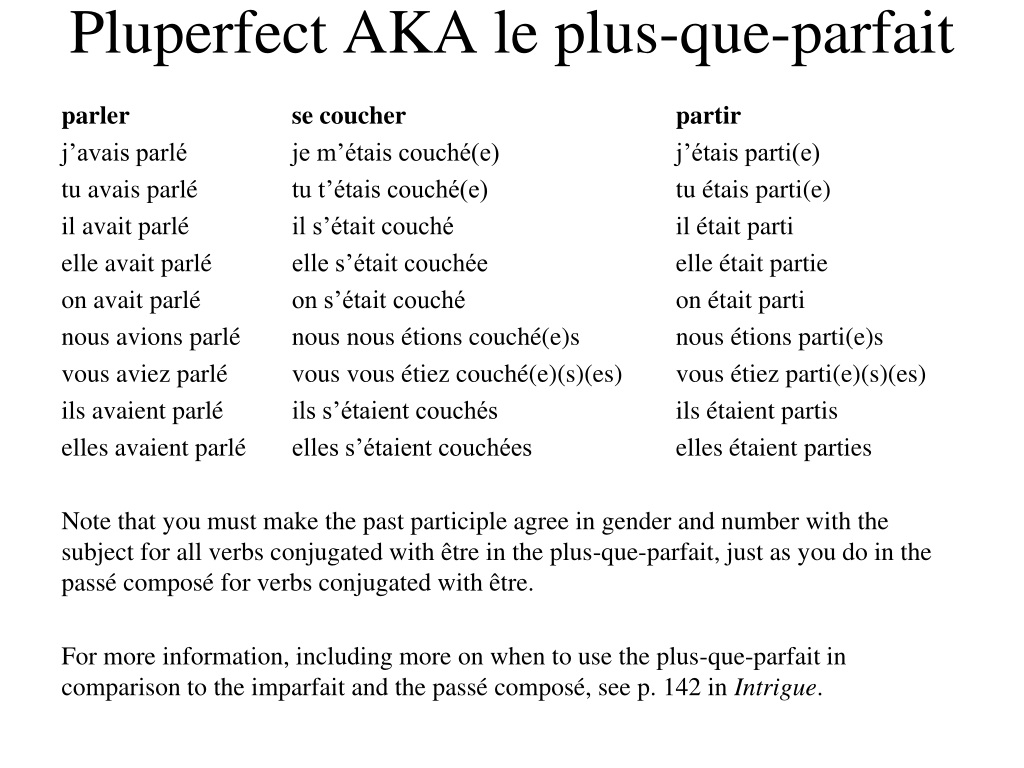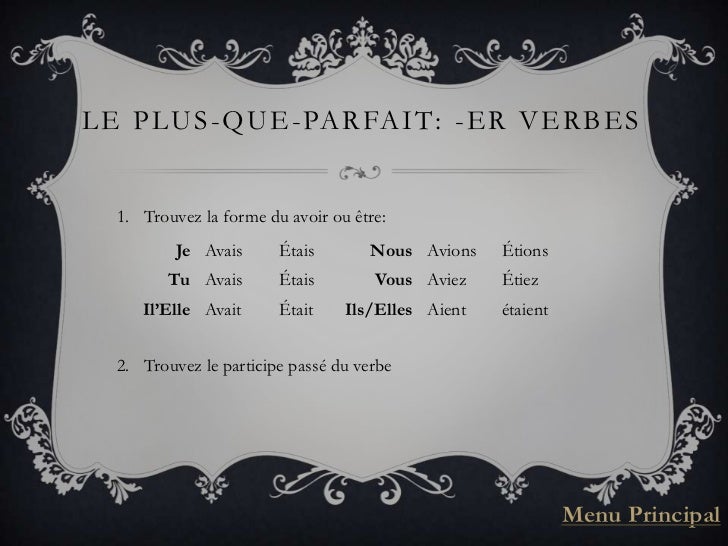

with 14 verbs of motion and staying still: naître/mourir, aller/venir, monter/descendre, arriver/partir, entrer/sortir, apparaître, rester, retourner, tomber, revenir, rentrer, remonter, redescendre, repartir.Most verbs construct the plus-que-parfait using avoir, however être is used as the auxiliary verb in the following cases: To conjugate the plus-que-parfait we use the imperfect forms of avoir and être as auxiliary verbs, followed by the participe passé (past participle) of the main verb.
#Plus que parfait conjugations how to#
How to conjugate the plus-que-parfait in French

This tense is usually used together with another past tense (such as the imparfait, the passé composé or the passé simple) and establishes the order of events: the action expressed in the plus-que-parfait always occurred before the action expressed by the other past tenses.Įxample: Elle avait beaucoup travaillé avant de pouvoir jouer le morceau parfaitement. We use the plus-que-parfait to talk about an action that occurred before another action in the past. When to use the plus-que-parfait in French Lors du concours de talents, Louise a joué sans fautes un morceau difficile à la flûte.Įlle avait beaucoup travaillé avant de pouvoir jouer le morceau parfaitement. Learn everything you need to know about the plus-que-parfait tense in French grammar with our quick and easy examples, then test your knowledge in the exercises. This lesson is included in my money saving FRENCH PROGRAM FOR SELF-LEARNERS. Use the audio recording to practice pronunciation. Handy one page plus-que-parfait tense conjugation chart of these 4 essential verbs. The plus-que-parfait is often used when telling stories and anecdotes to provide background information on situations that occurred prior to the main action of the story. Level B1 - Être, Aller, Avoir, Faire Plus-Que-Parfait Tense Conjugation Chart. We use it to talk about an action or situation that took place before another past action.
#Plus que parfait conjugations free#

Past (passé): formed with an auxiliary verb in the present infinitive.Past (passé): formed with an auxiliary verb in the present imperative.Past form 2 (passé deuxième forme): formed with an auxiliary verb in the imperfect subjunctive.Past form 1 (passé première forme): formed with an auxiliary verb in the present conditional.Pluperfect (plus-que-parfait): formed with an auxiliary verb in the subjunctive imperfect.Past (passé): formed with an auxiliary verb in the subjunctive present.Future perfect (futur antérieur): formed with an auxiliary verb in the simple future.Past perfect (passé antérieur): formed with an auxiliary verb in the simple past.Pluperfect (plus-que-parfait): formed with an auxiliary verb in the imperfect.To conjugate the plus-que-parfait we use the imperfect forms of avoir and tre as auxiliary verbs, followed by the participe pass (past participle) of the main verb. Present perfect (passé composé): formed with an auxiliary verb in the present How to conjugate the plus-que-parfait in French.Other compound tenses are constructed through the use of an auxiliary verb: Pluperfect / Plus-que-parfait of the French verb finir The Pluperfect tense conjugations for the French verb finir, along with their English translations. Tenses are described under the mood to which they belong, and they are grouped as follows. of the pass compos, or the plus-que-parfait instead of the imparfait. Below you will find the list of the french tenses. Have students practice French verb conjugation in different tenses and number. There are 8 compound tenses based on the conjugation of the auxiliaries in the 8 simple tenses added to the past participle. The auxiliary verb is always either avoir or être. Simple tenses have only one part ( je suis) whereas compound tenses have two: an auxiliary verb and the past participle ( j'ai été). The infinitive, participle, and gerundive are not verbal moods.Ĭonjugations for the different French verb tenses can be divided into two categories: simple and compound. There are seven different moods in French conjugation (among which four verbal moods): indicative (indicatif), subjunctive (subjonctif), conditional (conditionnel), imperative (impératif), infinitive (infinitif), participle (participe), and gerund (gérondif).


 0 kommentar(er)
0 kommentar(er)
